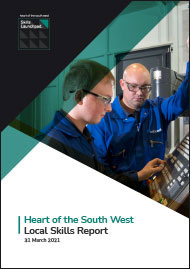6 Assessment of SAP Progress
Introduction
The Heart of the South West has a long history of joint working and collaboration around skills and employment matters, stretching back to the development of sub-regional arrangements in the late 1980s and 1990’s. As such, the area benefits from both a long-standing commitment to joint working and collaboration on skills matters between business, providers and public sector partners, with extensive experience in taking forward shared projects and ambitions.
Whilst this document encompasses the first iteration of a shared Skills Strategy and Action Plan for the Heart of the South West area, partners within the Heart of the South West have been working together around its core themes and ambitions for a number of years. At a LEP level, partners first formed the HotSW People Leadership Group in 2014, bringing together public, private and business representative to agree shared skills and employment objectives for the area’s Strategic Investment Plan, and direct the emerging European Social Fund and FE Capital Programmes. Partners have been active since this point in developing and implementing a range of programmes and shared projects across the area.
The launch of the Heart of the South West Skills Advisory Panel and the development of this document therefore, marks more of an evolution and acceleration of existing activity in the HotSW, then a revolution. The implementation of the SAP over the past year has provided an opportunity to reaffirm local partners commitment to working together to advance skills delivery and achievement, and to align behind key opportunities and needs.
The rest of this chapter provides a broad description of the current and recent activity of the SAP and SAP partners within the HotSW, and the progress already being made around the crucial themes of this document.
Impact on local skills provision
The Heart of the South West SAP benefits from a mature and long-standing set of relationships with local providers, including close working links between the LEP / SAP and its 11 colleges, 4 universities and the areas’ two training provider networks (Dorset and Somerset Training Provider network, and Devon and Cornwall Training Provider Network).
As such, provider and LEP / SAP prioritisation have been broadly aligned through partnership working in the Heart of the South West for a number of years, with strong growth across technical, STEM and high demand disciplines across the local provider landscape. Notably areas of joint work / delivery since 2014 include:
- Development of the South West Institute of Technology, bringing together 4 of the area’s Colleges (City College Plymouth, Exeter College, PETROC and Bridgwater and Taunton College) and its two universities to successfully bid for one of the UK original 12 IoTs, the consortia worked closely around the development of the scope and focus of the SW IoT, with its emphasis on engineering and digital skills at Level 4 and beyond.
- Delivery of skills provision linked to Hinkley Point, working closely with Bridgwater and Taunton College, DSTPN members and wider partners. Closely working around successive skills programmes emerging from Hinkley Point, including Bridgwater’s development of associated engineering and construction capacity, successful bids to secure the Southern Campus of the National College for Nuclear, and wider investment in engineering and construction capacity across the area.
- Delivery of Digital Skills within Exeter. Championed and funded by Exeter College and University of Exeter for several years, digital and STEM based provision has been an area of enhanced focus in the city. The LEP, working alongside the HotSW DSP, has sought to support this approach over recent years, seeking to reinforce investment and support for related programmes and projects as far as possible.
- Support for High Tech Engineering and Innovation in South and Northern Devon. Working with South Devon College and PETROC, the LEP has supported the development of STEM and engineering capacity at both colleges, seeking to enhance both their business responsiveness within core sector and apprenticeship capacity within LEP growth areas.
- Co-Development of Growth Fund Business Cases, ESF Projects and other provision. The SAP core team has also worked closely over the past 2 years with colleges, universities and wider provider partners to develop a range of joint applications and projects which have extended curriculum and delivery across the LEP area. This has included cross sector investment in digital capital development within the area’s Colleges; joint business cases to support the development of specialist sector capacity in nuclear, digital and marine with funding from BEIS and DFE; European funding support to enhance technical skills and apprenticeship provision covering engineering, health and other high demand skills areas; and most recently, funding to support digital and technical bootcamps and fast track retraining, working with both college and independent training providers.
Looking ahead, deepening integration between provider and SAP approaches is a key priority, with work already ongoing with multiple College around their future business plans and delivery approaches. It is anticipated that this joint working will be reinforced through new funding programmes, such as the Lifetime guarantee, Community Renewal Funding and wider opportunities, due to come online later in 2021.


